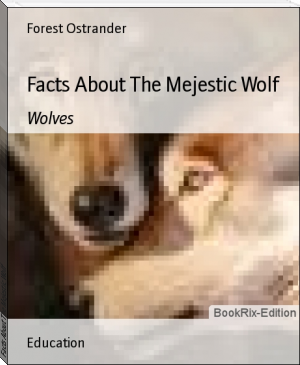Constelation History by Forest Ostrander (good summer reads txt) 📖

- Author: Forest Ostrander
Book online «Constelation History by Forest Ostrander (good summer reads txt) 📖». Author Forest Ostrander
came to Perseus and gave him several gifts to aid him in his fight with the
gorgons. Athena gave him her shield of polished gold to look into so he would
not have to look directly at the gorgons. Hermes (Mercury) gave him a pair of
winged sandals that would allow him to travel seven miles at one stride. Hermes
also gave Perseus a new-moon sword of pale gold, the only one that was sharp
enough to cut off Medusa’s head. Hades came to give him a helmet that would
turn Perseus invisible when he put it on. With these gifts and a special sack to
put Medusa’s head in, Perseus went to the cave of the gorgons.
When Perseus entered the gorgon’s cave, he placed the helmet of
invisibility on his head and, using the polished shield as a mirror, he examined
the head of each sleeping gorgon until he came to the Medusa with her hair of
hissing snakes. Being careful to keep looking only into his shield Perseus slashed
downward with his new-moon sword and the Medusa’s head was cut off.
Quickly, he scooped up the Medusa’s head, placed it in the sack, and ran from
the cave.
On his way home, Perseus was able to use the head to help rescue
Andromeda from the sea monster Cetus. Taking the beautiful Andromeda, who
became his wife, he returned home just in time to stop the forced marriage of
his mother Danae to Polydectes. When Perseus proved his mission a success by
showing Polydectes the Medusa’s head, Polydectes and his wedding guests all
turned to stone.
It is said that Perseus gave the Medusa’s head to Athena, who attached
it to the front of her shield. Perseus lived to a great old age and became the
king of Mycenae, which he founded. After his death, Zeus gave Perseus a place
among the constellations next to his beloved Andromeda.
One day as Aphrodite and
her son Eros (in Roman mythology
Venus and Cupid) were in the
woods they heard the monster
Typhon crashing through the
woods towards them. Aphrodite
took Eros’ hand and they ran
away as fast as they could. As
they ran, the noise of Typhon’s
approach got closer and closer.
Finally, Aphrodite and Eros had run so far that they reached the shores of the
Great Sea.
Knowing that the terrible Typhon would soon be upon them, Aphrodite
and Eros changed themselves into two fish and swam away to safety.
Zeus later immortalized this great escape by placing the figures of the
two fish, Pisces, among the constellations.
Other stories say that Poseidon sent two fish (dolphins) to save
Aphrodite and Eros, and these were the two fish that became Pisces.
Of all the constellations in the sky, no
group of stars has been known longer nor had
more different stories, legends, or myths told
about it than the Pleiades. There are at least
43 different stories or names for them.
However, there are only two that are closely
related to the Greek heroes or gods.
The Pleiades, according to the first
Greek myth, were the seven daughters of
Pleione and Atlas, the giant who bears the world upon his shoulders. These
seven maidens, along with their sisters the Hyades, (these are the small stars
forming the face of Tarus) were transformed into stars because of their
“amiable virtues and mutual affection” and because of their great sorrow at the
burden imposed upon their father, Atlas.
The second myth concerning the Pleiades tells how they were so beautiful
that Orion was constantly chasing them, which caused them a great amount of
discomfort. They appealed to Zeus for help and in pity for them he changed
them into doves. As doves they then flew up into the sky and found a hiding
place among the stars.
Sagittarius is usually described
as a centaur, horse from the waist
down and man above the waist. The
constellation was placed in the night
sky by Zeus to honor Chiron, the king
of the centaurs.
Chiron had galloped into a battle
where some bad centaurs were
attacking Hercules, and a good centaur,
Pholus. Hercules was defending Pholus
from the bad centaurs by shooting poison-tipped arrows at them. Not knowing
that Chiron was there, Hercules shot one of his poison-tipped arrows at him by
mistake and hit him. When Chiron fell to the ground, all of the other centaurs
galloped away.
Because he had been made immortal long before, Chiron did not die. He
would have to live in horrible pain forever. Zeus took pity on him and ended
Chiron’s great pain by allowing him to die.
This is the famous
Scorpion, which came up out of
the ground and was commanded
by Artimus to sting Orion, the
mighty hunter, and caused him
to die. That was the
punishment Orion received
because he had killed so many
animals for no reason, except to
try to impress her.
Scorpio was then placed into the sky on the opposite side of the world
from Orion so as to avoid any further conflict. It was also placed in the sky to
remind all of us that it is okay to kill animals for food, but it is wrong to kill
them just for the fun of it.
According to Greek mythology, Tarus
is the bull that carried the beautiful Europa
over the seas to the region of the world
that now bears her name.
Europa was the beautiful daughter of
Agenor, King of Phoenicia. It is said that
Europa was so beautiful that Zeus fell madly
in love with her. So Zeus changed himself
into a snow-white bull and mingled with the
herds of Agenor for which Europa was
caring.
Europa was charmed by the beauty of this great white bull and she began
to stroke its neck and pat its shoulders. Finally, she climbed onto its broad
back. The bull immediately began to move out across the sea to Crete where he
(Zeus) reassumed his divine form right before Europa’s startled eyes. Zeus had
successfully kidnapped Europa. To commemorate his feat, he placed the picture
of Tarus among the constellations, and on earth a continent was named for
Europa.
Ursa Major is one of the
oldest known constellations and
has more named stars in it than
any other constellation. It has
been known by many names, but
the form of the bear has become
the most common, even though
it’s quite difficult to see this
image in the stars.
In Greek mythology, Zeus
had many human girlfriends, but
his favorite was the beautiful
nymph Callisto. His secret visits
to earth to meet with her only
added to Hera’s jealousy and determination to get revenge against these women.
One day, as Zeus was walking through the forest with Callisto, he saw his
wife Hera coming. Unable to hide Callisto in time, he turned her into a
 The desire to acquire knowledge about the surrounding world and human society is quite natural and understandable for a person. Life is so developed that an uneducated person will never occupy a high position in any field. Humanity in its mass, and each person individually, develops objectively, regardless of certain life circumstances and obstacles, but with different intensity. The speed of development depends on the quality of training.
The desire to acquire knowledge about the surrounding world and human society is quite natural and understandable for a person. Life is so developed that an uneducated person will never occupy a high position in any field. Humanity in its mass, and each person individually, develops objectively, regardless of certain life circumstances and obstacles, but with different intensity. The speed of development depends on the quality of training.




Comments (0)